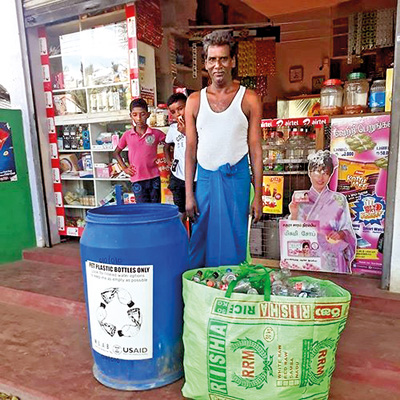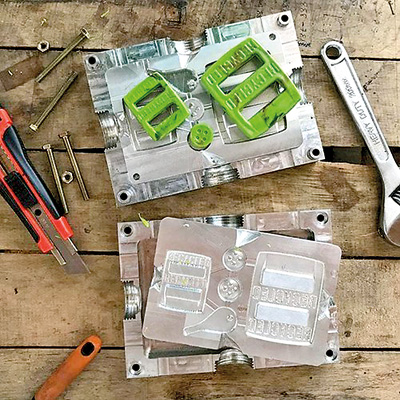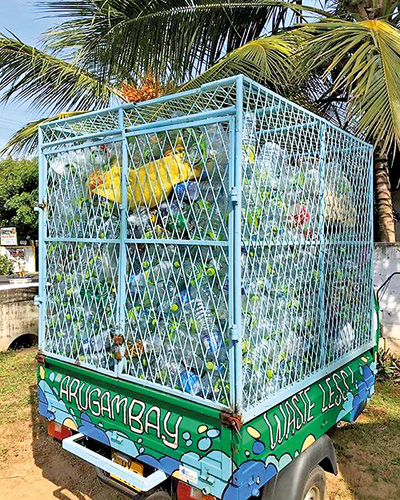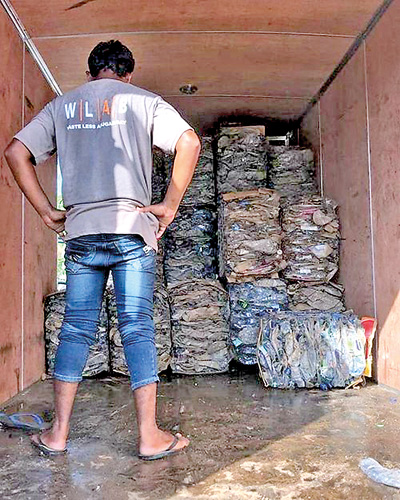Waste Less Arugam Bay (WLAB): Bringing solutions to the waste issue
Every little bit helps when it comes to addressing issues of waste and once in a way solutions are found that benefit a community in a beautiful way. Waste Less Arugam Bay (WLAB) is one of them.

Pix courtesy facebook.com/wastelessarugambay/
Perhaps the smallest possible waste management solution one could think of WLAB in reality is a simple channel through which to lower the amount of waste generated in a high tourist area. WLAB achieves this through an intervention approach, that is, practice waste management in public to initiate a change of behaviour.
“We all tend to never see the dimension of the waste problem because landfills are usually tucked away from the public eye,” the team at WLAB echoes thoughts adding, “So what we do is we collect waste, try to add value through recycling where we can and offer and promote alternatives.”
The project is led by founder Henry, along with Aliyar who drives their collection vehicle, Jahan who operates the machinery on-site, and the project manager Sulfi who is lobbying for their cause and carrying out awareness campaigns among school children about the plastic pollution problem.
They pointed out the fact that there is no reason why a destination like Arugam Bay could not function without a plastic bottle. However, for now, it is more the opposite with a peak capacity of 5000 tourists and an estimated 10,000 plastic bottles used per day. Waste management is also poor which results in people burning their waste, another harmful habit.
Living in Arugambay, the problem of plastic was constantly on the team’s minds. Eventually, they came up with a solution and pitched the idea to the Waste Management Authority, Dilmah, and other funding opportunities, and refined the ideas each time. When a USAID/DIG grant to avoid plastic pollution of the marine environment became public they considered the project and finally got the green light from USAID. A long effort eventually paid off.
What they do is they list water refill locations in Sri Lanka on their website www.getwater.lk for everyone to find access to refills. “But we also connect the refills we count with mitigation data because we often only talk about the environmental damage that is a plastic bottle after it has been used one single time,” says Henry adding “But it also takes around 7 liters of water to manufacture a PET bottle and we also try to tell that story. If we throw these bottles on a landfill those 7 liters are lost resources as well.”
Their solution to that became collecting the bottles and recycling them into polyester yarn for the fashion industry to mitigate the use of virgin polyester and all its environmental impact. They agree that it’s not the ideal solution, but it’s still a massive improvement.
The overall response from the Arugam Bay community, officials and tourists has been amazing for them. By trying to do something in a better way they have exposed themselves to the “but you also …” argument. Are they really eco-friendly collecting plastic waste with a diesel engine three-wheeler? Isn’t recycled polyester clothing also bad for the environment? Those are the more frequent challenges they face.
“Of course we would prefer to only collect biodegradable waste for a permaculture farm with a vehicle powered by Arugam Bay’s frying oil,” says Henry. “I feel we are still very mainstream in what we do and not bold enough for the extent of the problem. But at least we do things a bit different and provoke thinking and opinions.”
Waste Less Arugam Bay is a verified Fair Trade by the World Fair Trade Organization and therefore they’re making the first Fair Trade recycled plastic products worldwide that are verified from start to finish. Their hope is to market these products for export in order to gain funds that they can use to experiment with more ways to add value to waste.
For the team at WLAB the best part about this project is the positivity. The team is very motivated and they are proud that they do an important job. The warm feedback they receive helps them along. However, what they truly love is that they are actually able to make a small contribution to a better system.
Approaching the end of their funding period, the team is uncertain about its future. They can see how little monetary gain there is in waste management. However, apart from this work being their bread and butter they are also really proud that they do something for the betterment of their community.
“Being into waste is normally not a very high prestige job but the way we do it we are proud and feel appreciated for our work.”
Follow the team on www.facebook.com/wastelessarugambay/

Recycled buttons and buckles




